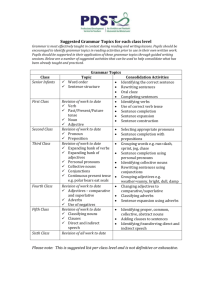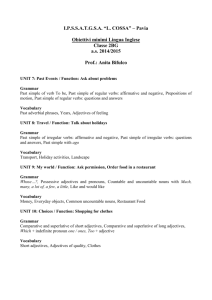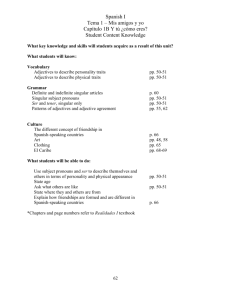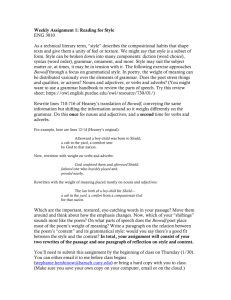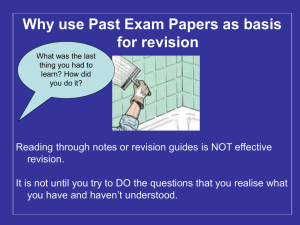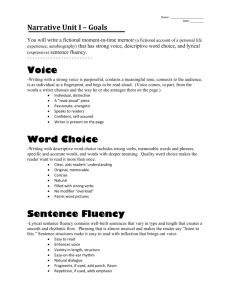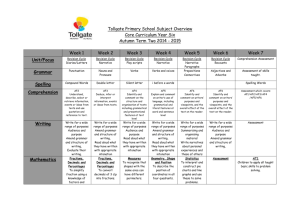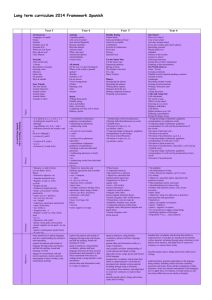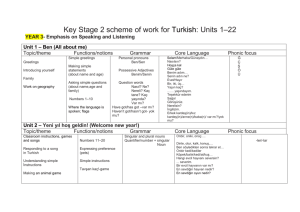UnitOverviewforYear4
advertisement
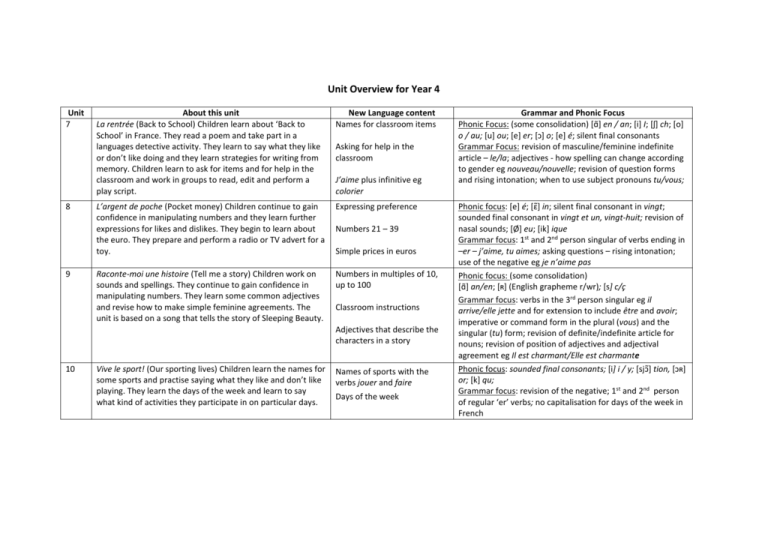
Unit Overview for Year 4 Unit 7 8 9 About this unit La rentrée (Back to School) Children learn about ‘Back to School’ in France. They read a poem and take part in a languages detective activity. They learn to say what they like or don’t like doing and they learn strategies for writing from memory. Children learn to ask for items and for help in the classroom and work in groups to read, edit and perform a play script. New Language content Names for classroom items L’argent de poche (Pocket money) Children continue to gain confidence in manipulating numbers and they learn further expressions for likes and dislikes. They begin to learn about the euro. They prepare and perform a radio or TV advert for a toy. Expressing preference Raconte-moi une histoire (Tell me a story) Children work on sounds and spellings. They continue to gain confidence in manipulating numbers. They learn some common adjectives and revise how to make simple feminine agreements. The unit is based on a song that tells the story of Sleeping Beauty. Numbers in multiples of 10, up to 100 Asking for help in the classroom J’aime plus infinitive eg colorier Numbers 21 – 39 Simple prices in euros Classroom instructions Adjectives that describe the characters in a story 10 Vive le sport! (Our sporting lives) Children learn the names for some sports and practise saying what they like and don’t like playing. They learn the days of the week and learn to say what kind of activities they participate in on particular days. Names of sports with the verbs jouer and faire Days of the week Grammar and Phonic Focus Phonic Focus: (some consolidation) [ɑ̃ ] en / an; [i] I; [ʃ] ch; [o] o / au; [u] ou; [e] er; [ɔ] o; [e] é; silent final consonants Grammar Focus: revision of masculine/feminine indefinite article – le/la; adjectives - how spelling can change according to gender eg nouveau/nouvelle; revision of question forms and rising intonation; when to use subject pronouns tu/vous; Phonic focus: [e] é; [ɛ̃] in; silent final consonant in vingt; sounded final consonant in vingt et un, vingt-huit; revision of nasal sounds; [Ø] eu; [ik] ique Grammar focus: 1st and 2nd person singular of verbs ending in –er – j’aime, tu aimes; asking questions – rising intonation; use of the negative eg je n’aime pas Phonic focus: (some consolidation) [ɑ̃ ] an/en; [ʀ] (English grapheme r/wr); [s] c/ç Grammar focus: verbs in the 3rd person singular eg il arrive/elle jette and for extension to include être and avoir; imperative or command form in the plural (vous) and the singular (tu) form; revision of definite/indefinite article for nouns; revision of position of adjectives and adjectival agreement eg Il est charmant/Elle est charmante Phonic focus: sounded final consonants; [i] i / y; [sjɔ̃] tion, [ɔʀ] or; [k] qu; Grammar focus: revision of the negative; 1st and 2nd person of regular ‘er’ verbs; no capitalisation for days of the week in French 11 Le carnaval des animaux (Carnival of animals) This unit is based on The Carnival of the Animals by Saint-Saëns. The children learn to describe animals characterised by the music and talk about their natural habitats. They learn how to tell the time on the hour. Names of animals and some animal habitats Adjectives to describe animals Some adverbs Telling the time on the hour and asking the time 12 Quel temps fait-il? (What’s the weather like) Children learn weather phrases and use negative numbers. Aesop’s fable Le Vent et le Soleil (The Wind and the Sun) is used. Children learn the names of common articles of clothing and relate these to the weather. They learn to say the date and to write and say telephone numbers. More weather phrases: il neige, il gèle Names of items of clothing Saying the date Phonic focus: revision of [u] ou; difference between [u] ou and [y] u; [k] qu; silent h; silent final consonants; pronunciation of adjectives with -e ending and without; synthesis of known phonemes to form phonetically regular words Grammar focus: using a wider range of question forms to ask and answer questions ; adverbs; revision of adjectival agreement; revision of subject pronouns; revision of verbs – 3rd person singular Phonic focus: [ɔ̃] on, [ɔn] one/onne, revising common phonemes e.g. [ɛ] e, [e] é, [ɑ̃ ] an/ en; consolidation of phoneme-grapheme correspondences; breaking words into individual phonemes; synthesising phonemes to build phonetically regular words Grammar focus: prepositions; singular/plural of indefinite article ie un/une/des; no capitalisation for date; ordinal numbers
